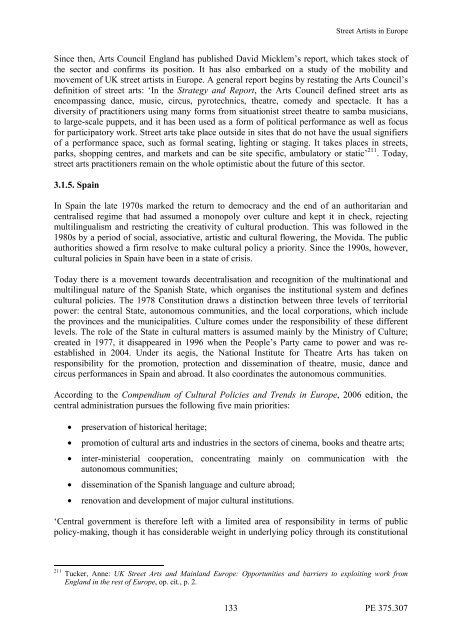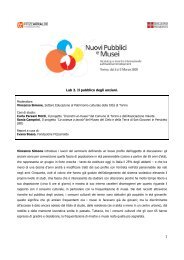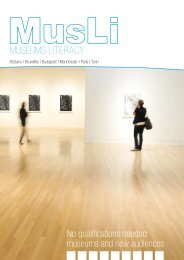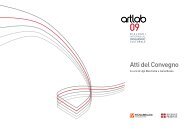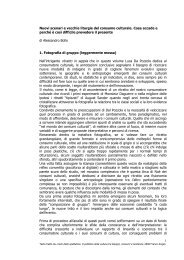STREET ARTISTS IN EUROPE - Fondazione Fitzcarraldo
STREET ARTISTS IN EUROPE - Fondazione Fitzcarraldo
STREET ARTISTS IN EUROPE - Fondazione Fitzcarraldo
You also want an ePaper? Increase the reach of your titles
YUMPU automatically turns print PDFs into web optimized ePapers that Google loves.
Street Artists in Europe<br />
Since then, Arts Council England has published David Micklem’s report, which takes stock of<br />
the sector and confirms its position. It has also embarked on a study of the mobility and<br />
movement of UK street artists in Europe. A general report begins by restating the Arts Council’s<br />
definition of street arts: ‘In the Strategy and Report, the Arts Council defined street arts as<br />
encompassing dance, music, circus, pyrotechnics, theatre, comedy and spectacle. It has a<br />
diversity of practitioners using many forms from situationist street theatre to samba musicians,<br />
to large-scale puppets, and it has been used as a form of political performance as well as focus<br />
for participatory work. Street arts take place outside in sites that do not have the usual signifiers<br />
of a performance space, such as formal seating, lighting or staging. It takes places in streets,<br />
parks, shopping centres, and markets and can be site specific, ambulatory or static’ 211 . Today,<br />
street arts practitioners remain on the whole optimistic about the future of this sector.<br />
3.1.5. Spain<br />
In Spain the late 1970s marked the return to democracy and the end of an authoritarian and<br />
centralised regime that had assumed a monopoly over culture and kept it in check, rejecting<br />
multilingualism and restricting the creativity of cultural production. This was followed in the<br />
1980s by a period of social, associative, artistic and cultural flowering, the Movida. The public<br />
authorities showed a firm resolve to make cultural policy a priority. Since the 1990s, however,<br />
cultural policies in Spain have been in a state of crisis.<br />
Today there is a movement towards decentralisation and recognition of the multinational and<br />
multilingual nature of the Spanish State, which organises the institutional system and defines<br />
cultural policies. The 1978 Constitution draws a distinction between three levels of territorial<br />
power: the central State, autonomous communities, and the local corporations, which include<br />
the provinces and the municipalities. Culture comes under the responsibility of these different<br />
levels. The role of the State in cultural matters is assumed mainly by the Ministry of Culture;<br />
created in 1977, it disappeared in 1996 when the People’s Party came to power and was reestablished<br />
in 2004. Under its aegis, the National Institute for Theatre Arts has taken on<br />
responsibility for the promotion, protection and dissemination of theatre, music, dance and<br />
circus performances in Spain and abroad. It also coordinates the autonomous communities.<br />
According to the Compendium of Cultural Policies and Trends in Europe, 2006 edition, the<br />
central administration pursues the following five main priorities:<br />
• preservation of historical heritage;<br />
• promotion of cultural arts and industries in the sectors of cinema, books and theatre arts;<br />
• inter-ministerial cooperation, concentrating mainly on communication with the<br />
autonomous communities;<br />
• dissemination of the Spanish language and culture abroad;<br />
• renovation and development of major cultural institutions.<br />
‘Central government is therefore left with a limited area of responsibility in terms of public<br />
policy-making, though it has considerable weight in underlying policy through its constitutional<br />
211 Tucker, Anne: UK Street Arts and Mainland Europe: Opportunities and barriers to exploiting work from<br />
England in the rest of Europe, op. cit., p. 2.<br />
133<br />
PE 375.307


